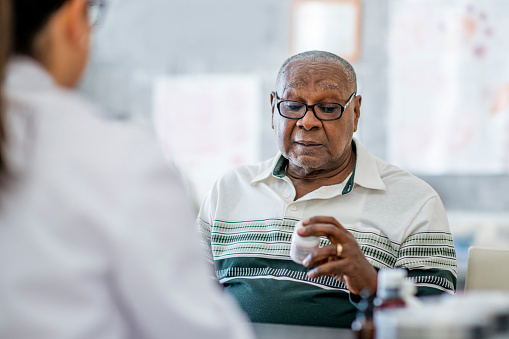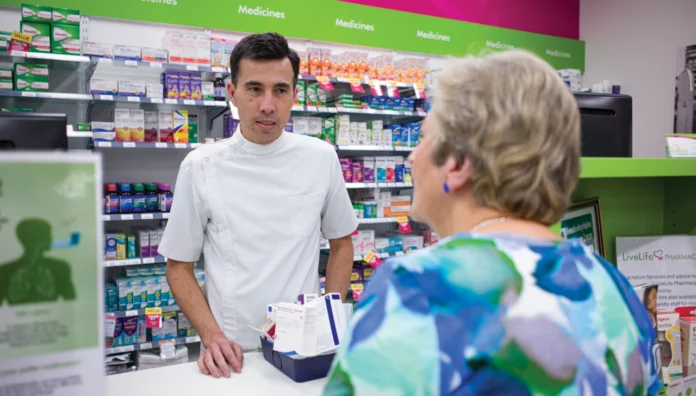Just as CPR training can help save a life, mental health first aid (MHFA) is vital education for all pharmacy staff.
One in two Australians will experience mental ill health during their lifetime. Medicine use for mental illness is common, with 18% of Australians filling a prescription for a mental health medication in 2021–22. And people with severe mental ill health often have poorer health than the general community, with a lifespan that is 12–16 years shorter.1
For pharmacists, it is important to have the right skills to assist someone who may need immediate help.
Using case studies, videos and other resources, MHFA training builds on existing knowledge to ensure pharmacists and pharmacy staff can identify early warning signs of mental ill health and provide useful support and referrals where necessary.
The PSA runs training tailored to the pharmacy environment, including in South Australia, where the PSA MHFA course is funded by the state government.
More than 900 pharmacists, pharmacy staff and students have completed MHFA training through PSA since 2020. Research conducted by pharmacy students at the University of Sydney shows MHFA training improves the recognition of mental illnesses, helps to reduce stigma, and improves confidence in providing services.2
PSA’s Manager of Training Delivery and Assessment, community pharmacist Kevin Ou MPS, says participants find it ‘very impactful’ and are able to put what they’ve learnt into practice right away.
‘The MHFA training is so beneficial for pharmacists because we interact with people experiencing mental health problems all the time,’ he says.
‘We are in a position to identify signs and symptoms of mental ill health early on and to support a person to receive appropriate professional help. Often, we are the first health professional with whom a person has ever discussed their mental health problems.’
There are many opportunities to have impactful conversations, including when a patient comes into the pharmacy for something unrelated to their mental health. The key is recognising when this is appropriate, Mr Ou says.

‘We might see someone at a time when they are feeling distressed, anxious or in a low mood. For example, if they are starting a new medicine or have just been diagnosed with a new medical condition.
‘These are opportunities for pharmacists to have very meaningful conversations to support the patient through their health journey.’
PSA Professional Practice Pharmacist Chloe Tobin MPS is accredited to provide MHFA training. She says it is important that all pharmacy staff, not just pharmacists, receive the right education.
‘Mental health first aid training is crucial for pharmacy staff, as it enables early recognition of mental health issues, reduces stigma and improves patient care.
By addressing mental wellbeing alongside physical health, pharmacy staff can be more confident in ensuring safety in crises, supporting colleagues’ mental health, enhancing communication skills, contributing to community health and promoting personal growth and wellbeing.’
AP asked Mr Ou and community, ACCHO and accredited pharmacist Helene Wightman MPS to share how MHFA training prepared them to help patients experiencing mental ill health.
Case 1

Kevin Ou MPS
Community pharmacist, PSA manager — Training delivery & Assessment, Potts Point, New South Wales
MHFA skills are not only beneficial for identifying and helping someone experiencing mental ill health for the first time, but also those already living with a mental health condition. Recently, I had a patient who wanted to return their prescription medicine for anxiety. They were upset because they had found out the medicine could cause weight gain.
At first, they didn’t want to talk about it any further and just wanted a refund. They said they didn’t trust anything I had to say, which was upsetting, but I remained patient and understanding. I could see their anxiety levels were high and they looked very upset.
I wanted to explore their concerns further, and used my MHFA skills to do so, using messaging that included:
- I care, so I want to ask you more questions about your issues with this medicine.
- I am concerned because I can see you are very distressed and I want you to be safe.
- I want to help, and as a pharmacist I can help by giving you accurate information about the medicine. I am a medicines expert.
I also aimed to reassure the patient using my tone of voice and body language, and by ensuring the environment was a safe space to conduct a sensitive conversation. I acknowledged and validated their distress, assessing the crisis and asking them directly about suicide. We discussed how common anxiety is and the various treatments available, both pharmacological and non-pharmacological options such as psychology.
In the end, the patient told me that no one, including their GP, had ever shown how much they cared. They felt heard. They were so embarrassed about their mental illness and needing medicine but didn’t realise how common it was. The patient decided to give the medicine a go, knowing that their local pharmacy cared and that they could speak with the pharmacists if they experienced adverse effects or had other questions.
Case 2

Helene Wightman MPS
Community, accredited and ACCHO pharmacist, Ballina, New South Wales
Mrs AB, aged in her early 70s, slumped in a chair near the dispensary and fidgeted with her car keys. She had no prescription to collect and did not ask for assistance.
Relatively new as the forward dispensing pharmacist, I introduced myself and asked how I could help.
With no response, I crouched down to her eye level and said: ‘Are you okay?’ After some time, she burst into tears and said, ‘I feel so lonely and isolated.’
After fetching a glass of water and some tissues and giving her time to compose herself, I recalled the ALGEE mental health first aid action plan acronym:
Approach, assess and assist
Listen non-judgmentally
Give support and information
Encourage appropriate professional help
Encourage other supports.
Mrs AB’s partner had died suddenly before the COVID-19 lockdown. Afterwards she ‘didn’t feel right’ and stayed away from family and friends.
Her isolation worsened when lockdown occurred, and since then she had taken to driving as her one ‘joy’ in life, but had recently staring crying while driving.
She was on no medicines for any condition. I let her tell me about her feelings and then we discussed support and help. I assured her she was not alone, and Mrs AB admitted she wanted to see her doctor but assumed she would not get an appointment ‘because he is always so busy’. I received her consent to call the surgery and was able to make an appointment for the following day.
I also suggested a dose of paracetamol before bed to help with the knee pain that affected her sleep, worsening everything.
‘Is there something else I can do to help today?’ I asked.
‘Yes,’ she said. ‘I need a hug, if that’s okay?’
‘Well, of course.’ I wear a buttercup-yellow shirt mostly and am known to give hugs – the human touch is important.
Two weeks later, after her second GP visit, Mrs AB felt a bit better and her sleep had improved. With an appointment scheduled with a psychologist, she had brought along a script for a 10 mg daily dose of escitalopram.
We discussed the onset of action, the potential adverse effects and sometimes the worsening of depression when initiating the medicine.
Six months later, she was spending time with family and friends and was back to her driving. She still needs the occasional hug from her pharmacist though!
Kevin Ou’s top tips
- Be respectful. Consider whether it is a suitable time to have the conversation. Always respect the person’s privacy and confidentiality by asking if they are comfortable or would prefer to move to a more private space.
- Look for signs and symptoms of a crisis. If you think someone is having suicidal thoughts, ask them directly about suicide.
- Be prepared. Have resources in place to support someone experiencing a mental health problem. Know the available referral pathways and mental health services.
- Don’t give up. Try not to take it personally if the person does not positively engage with you at first. They may seem angry, irritated or upset; this is often not intentionally directed at you but rather an indication of how bad they are feeling.
- Use non-judgemental language. Discuss how common mental illnesses are; this can normalise the conversation about mental health problems and break down stigma.
- Empower your patients. When providing your recommendations, give the person options so they can choose the help they would like to receive, rather than telling them what you think they need.
- Practise self-care. Ensue you have a way of dealing with your own feelings after the interaction. These conversations can make you feel exhausted or worn out, so do things to improve your own mental health.
References
1. Pharmaceutical Society of Australia. Medicine Safety: Mental health care. 2023. At: https://www.psa.org.au/advocacy/working-for-our-profession/medicine-safety/
2. O’Reilly CL, Bell JS, Kelly JP, et al. Impact of mental health first aid training on pharmcy students’ knowledge, attitudes and self-reported behaviour: a controlled trial. Aust N Z J Psychiatry 2011;45(7):549–57. At: https://pubmed.ncbi.nlm.nih.gov/21718124/



 John Jones MPS, pharmacist immuniser and owner of My Community Pharmacy Shortland in Newcastle, NSW[/caption]
John Jones MPS, pharmacist immuniser and owner of My Community Pharmacy Shortland in Newcastle, NSW[/caption]


 Debbie Rigby FPS explaining how to correctly use different inhaler devices[/caption]
Debbie Rigby FPS explaining how to correctly use different inhaler devices[/caption]




 Professor Sepehr Shakib[/caption]
Professor Sepehr Shakib[/caption]

 Lee McLennan MPS[/caption]
Lee McLennan MPS[/caption]
 Dr Natalie Soulsby FPS, Adv Prac Pharm[/caption]
Dr Natalie Soulsby FPS, Adv Prac Pharm[/caption]
 Joanne Gross MPS[/caption]
Joanne Gross MPS[/caption]








